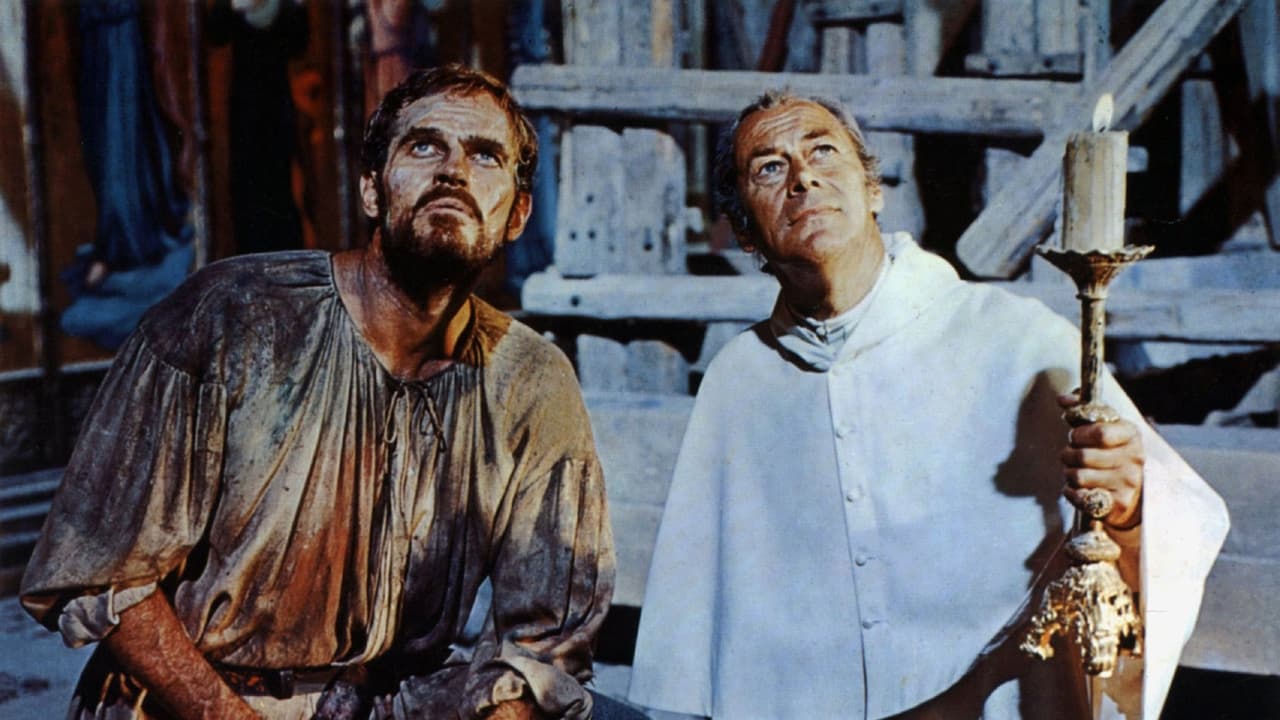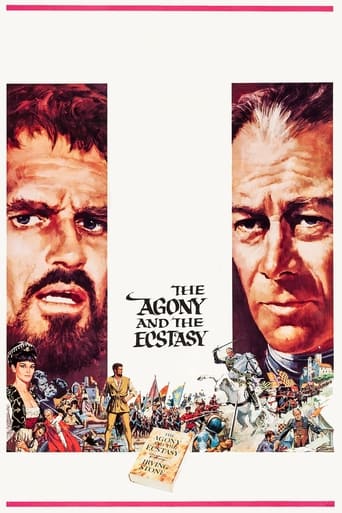PlatinumRead
Just so...so bad
Stevecorp
Don't listen to the negative reviews
Afouotos
Although it has its amusing moments, in eneral the plot does not convince.
Phillida
Let me be very fair here, this is not the best movie in my opinion. But, this movie is fun, it has purpose and is very enjoyable to watch.
Ian
(Flash Review)This film paints a picture, pun intended, of the process for how the Sistine Chapel got painted. Pope Julius II commissioned Michelangelo, who was primarily a sculpture, to tackle this impressive frescoes task. Amusing to think Michelangelo's 2nd best trade was painting vs chiseling figures from stone! During the project the two men banter back and forth upon the direction of the frescoes, time it is taking and compensation, which is actually mildly amusing. Pope Julius II is a beast, odd way to describe a Pope, as he still fought in battles on a horse while wearing battle armor. Overall, it doesn't feel as long as it is while it has an epic feel to it. It has some nice historical scenes of the wax and paint dripping in Michelangelo eyes and face and the exhaustive toll it takes on both men. Additionally, the first 15-20 minutes of the film was an actual documentary of the historical Italian art and artists to set the stage for how magnificent the Sistine Chapel truly is.
edwagreen
How befitting for Charlton Heston to play the head sculptor turned painter in this rather lavish production. Some of the lines were reminding me of "The Ten Commandments," the Lord creating man in his own image. As he was the under-dog in both 'Commandments' and "Ben-Hur," Heston assumed a similar role here.Nevertheless, he was over-shadowed by a memorable performance by Rex Harrison, as a pope intent on preserving religious battles and literally going out to battle in so called religious wars.The film deals with the battle between the pope and Heston character in that the former wanted the latter to paint the ceiling of the Sistine Chapel.It shows how both men bend and ultimately are on the same page. Devotion to religious values is surely a major theme of this very good film.
lasttimeisaw
The film is an epic grandeur feature of a interpersonal tug-of-war between the maestro Michelangelo and Pope Julius II.I cannot help being shell-shocked to see the reconstruction of the magnificent ceiling though recognizably most of which is the trickery of montage (not in the real the Sistine Chapel, the location was inside Cinecitta Italy instead), but bathing under the glamour and solemnness of the visual wonders, I am stunned to exude my admiration and awe!The two leads conspicuously stimulate a Moses versus Caesar confrontation, Charlton Heston seems to be more boorish than artistic to manifest a struggled Michelangelo, may God doesn't distinguish his people by their looks. The "agony and ecstasy" is watered down to an underwhelming stalemate thanks to Charlton's outlandish incarnation as the most eminent artist of that time. Rex Harrison, is by far and large worthy another Oscar nomination for his arresting devotedness, which is apt to impress the audience with a mind-blowing bi-polar characterization while good and evil coexist at the same time.The film was a grave box office fiasco when it came out in 1965, however, judging by my appraisement, its merits still can be appreciated by our generation (a well-balanced script, the haunting original score and all the props and settings). However, the film entirely skipped Michelangelo's sexual orientation and awkwardly ploys a portentous conversation between Michelangelo and his admirer Contessina de'Medici (a over-wise Diane Cilento), which unveiled its cowardliness and helplessness.My final remark is that as time goes by ruthlessly, art stands still and never fades away, so lucky enough cinema is yet a part of it.
clivey6
Okay, okay, it's not that bad, I just had to use that joke... Then again, it's a close thing in the early days. It begins with a 10-minute rushed bio of Michelangelo narrated by an American who's no Kenneth Clark... it sounds like those awful Disney documentaries. Lots of shots of Michelangelo's sculpture and so on...Then the movie gets underway and it's Heston as the artist and Harrison as the Pope. Except they always play the same types mostly, so it sort of lacks credibility. Harry Andrews wasted in a support role. Adolfo Celi, who played Largo in Thunderball one year earlier, is dubbed (badly) into American. Diane Cilento, Sean Connery's then-wife, is a not very attractive harpy type, a kind of love interest/shoulder to cry on. During one awful moment she bucks up the distraught artist, saying, "And get that ceiling finished!" sounding for all the world like some nagging housewife. "And then you're to fix the garden gate and call round my mother-in-law's!" It gets better as it goes on, after the interval. And it's good to see Harrison playing a more devout type, rather a rascally self-centred rogue. But much of it seems to be about conflict and argument for the sake of it, to create a drama of some kind.

